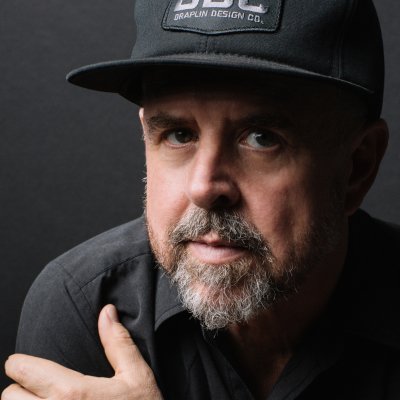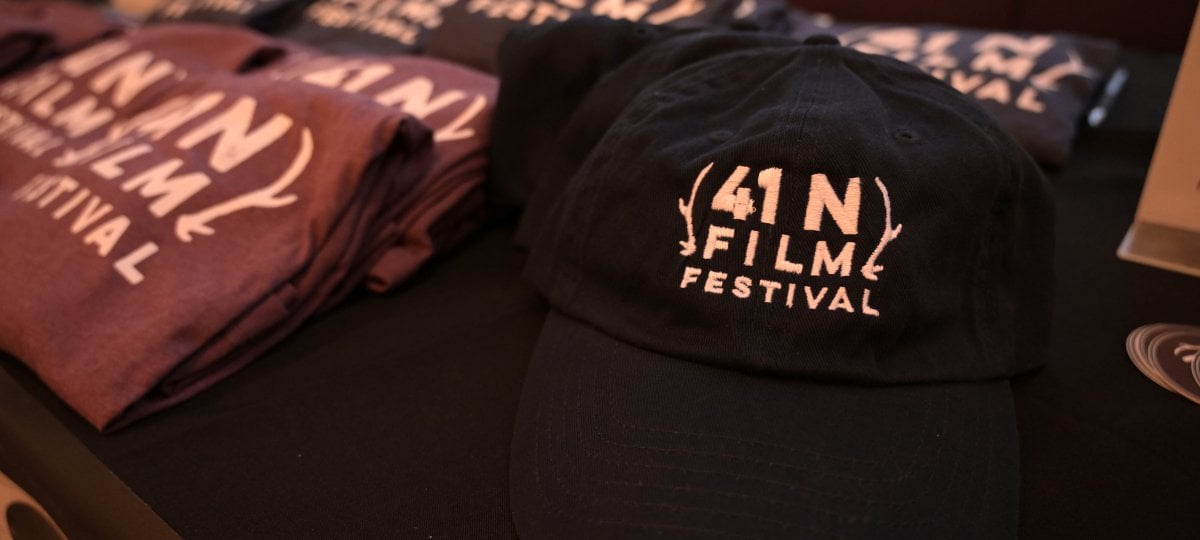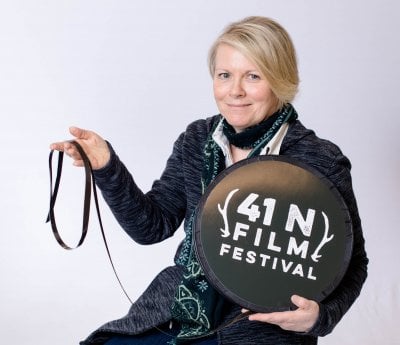The 41 North Film Festival returns to Michigan Technological University for its 10th anniversary on Nov. 7-10. Among the celebrations, the festival will feature a one-of-a-kind documentary that will be different for each audience who views it.
A film about musician Brian Eno that uses generative artificial intelligence technology to create a unique experience for the audience each time it's shown is part of a stellar lineup of independent films at this year's 41 North. Film topics range from hummingbird rescue and a small-town radio telescope to the business of grief in a world with AI, and how we measure happiness.
Since the film festival's debut 10 years ago, 41 North has grown thanks in part to the depth, variety and quality of its cinematic offerings. Accessibility is also a draw. Housed in Michigan Tech's Rozsa Center for the Performing Arts, all film festival screenings and events are free and open to the public. Another factor in the fest's longevity is the way it inspires campus and community, said Erin Smith, the driving force behind the event.
"When you sit in an audience with others and you experience a new understanding of something or you laugh or worry about something together, it can be transformative in a way that's not possible at home, even with the best home theater system," said Smith, the director of Michigan Tech's Humanities Digital Media Zone and a teaching professor in digital media and cinema for the Department of Humanities. Smith began the event in 2006 as the Northern Lights Film Festival because she wanted her students to experience films with a live audience.
As it has grown, the festival has enjoyed support from volunteers, sponsors, filmmakers and University departments across campus. The presentation of "Eno," which is sponsored by the Michigan Tech College of Computing and the Institute of Computing and Cybersystems (ICC), illustrates the festival's multidisciplinary approach to building community and encouraging dialogue.
From the beginning, it was important to Smith to bring students independent films they would not otherwise have the opportunity to see. She's persistent in her quest to bring films that will appeal to a variety of audiences and prompt meaningful discussions. Scouting is an ongoing process. She attends film festivals across the country, closely follows the work of her favorite filmmakers and isn't afraid to pursue something that first appears to be out of reach.
Drawing filmmakers to a remote and relatively small film festival is a challenge. But Smith has leveraged that to work in the fest's favor. "Sometimes when I show people where we are on a map, they don't really understand how remote we are and how far we are from opportunities like these — and that sometimes wins the day," she said.
Bringing a New AI Film to the Festival
Smith first saw "Eno," a 2024 documentary about musician and artist Brian Eno, at the Full Frame Documentary Film Festival in Durham, North Carolina, last April. She knew immediately she wanted to bring it to 41 North.

Produced by director Gary Hustwit in partnership with creative technologist Brendon Dawes, "Eno" brings the provocative innovation of generative AI to filmmaking. The film premiered at the Sundance Film Festival and has since been screened at dozens of venues and film festivals around the world.
In a serendipitous moment on her way home from Full Frame, Smith happened to see Hustwit at the airport. "I went up to him and gushed about the film, talked about Brendan Dawes and told him a little bit about the 41 North Film Festival," Smith said.
Not long after, Smith began her efforts to bring the film to Houghton. "It was a little tortured. It's always a process, getting a film like this," Smith said. "I reached out pretty early, but I didn't hear back." She reached out again. Finally, the deal was struck.
"I don't know exactly what factors aligned to make this happen," Smith said. "But we're very fortunate to have this exceptional film as part of the festival this year."
Hustwit will screen two iterations of "Eno" at 3:30 p.m. and 7:30 p.m. on Saturday, Nov. 9. A reception and Q&A will take place between showings. Hustwit will be at the event in person, with Dawes joining via Zoom.
"With live theater and concerts, you always expect there to be something unique and specific about a particular performance," said Smith. "With 'Eno,' Hustwit and Dawes bring the documentary film into that arena. As Gary tours with it, he generates a kind of live performance every time."
The College of Computing and ICC's sponsorship of "Eno" is in keeping with ongoing efforts to showcase the creative and human potentials of computing. Professor Charles Wallace in the Department of Computer Science is among faculty who is asking students to attend the screening and will be attending himself.
"Generative AI, as it is now commonly used, can fall into a pit of conventionality," said Wallace. "What's being generated is based on a body of data that the system has been trained on. At its worst, it can seem like an unimaginative rehash of that data. The idea behind 'Eno' cuts against that. It's using the same technology to recast a story with an endless variety of viewpoints and timelines."
Wallace notes that Michigan Tech's annual Art in Silico exhibition and event series, also supported by the College of Computing and ICC, explores synergies between art and technology in a similar way.
Wallace has been a fan of Eno's music since he was a teenager. "Eno brings a spirit of humanity and spontaneity to everything he's done in his music and art, so I'm not surprised that this film blends those concepts," he said. "I'm looking forward to getting a fresh new perspective on one of my heroes."
Smith said that Hustwit and Dawes formed a company called Anamorph to develop the proprietary software used to produce "Eno."
"They've been protective of what they're doing, but festival-goers will have an opportunity to learn more about the software at the Q&A following the first screening of the film," said Smith.
Supporting (and Supported By) Community
Staging the festival is a feat of organization and determination. Smith remains motivated by 41 North's impact on students and the community. Several Michigan Tech students have joined the independent film circuit — and some have brought their own films back to the festival.
One of Smith's favorite community thank-yous came from the Gemignani brothers, local restaurateurs who raced to see "King Georges," a documentary about chef Georges Perrier, between shifts at their restaurant in 2015. The brothers shared that they spent a joyful evening discussing the film as they prepped food for the next day's menu.
Smith is especially grateful to Tech's humanities department for its continued support and understanding of the value the festival brings to students and regional audiences. The Rozsa Center's assistance has been key to elevating the event, as well. The Rozsa assists with sound and lighting, film showings, public receptions and discussion panels. Not to mention concessions that make plopping into a comfortable theater seat for an afternoon or evening that much more palatable.
"I couldn't do any of it without all the University and community support," Smith said. Among the many individuals that make 41 North possible, Smith particularly wishes to recognize long-time volunteer coordinator Allison Neely, calling her the festival's "unsung hero" and a bridge to the Rozsa since 2016.
What to Watch at This Year's Festival
This year's festival brings the community 20 independent films. Most showings take place in the Rozsa Center, although two films will be shown in Fisher Hall, Room 135 in collaboration with the student Film Board. The festival schedule is also interspersed with music, panel discussions and kid-friendly workshops. No tickets are required and all films and events are free.
A full schedule and descriptions of each film are available online. In addition to "Eno," several other films stand out in this year's lineup.
Opening Night Documentary: "Agent of Happiness"
Can we quantify and measure happiness? The Kingdom of Bhutan makes the case that we can, and even has a Ministry of Gross National Happiness that does just that. The 41 North opening film "Agent of Happiness" follows happiness agent Amber Gruung as he meets with people across the country to empathetically administer a 148-question happiness survey. The film also explores Gruung's questions about his own quality of life. The film will be followed by a Q&A with Kayla Gabehart, assistant professor of environmental policy, and Daniel Shtob, assistant professor of sustainability and health, from Michigan Tech's Department of Social Sciences.
"Eternal You" Explores Grief in the Era of AI
In "Eternal You," documentary makers Hans Block and Moritz Riesewieck ask the question, "What if you never had to say goodbye to a loved one?" The dead return to digital life through open-language-model AI technology that enables realistic conversations with virtual reality avatars built using characteristics of the deceased. The film offers perspectives from end-users, tech experts, journalists, programmers and psychologists to explore the vast and often disturbing implications of this new technology. The film will be followed by a panel discussion with Department of Humanities faculty members Carrie O'Connel, visiting assistant teaching professor of communication, culture, and media, and Alexandra Morrison, associate professor of philosophy, as well as Jeffrey Pettibone, a visiting professor in the Department of Psychology and Human Factors.
Great Lakes Conservation and Sovereignty in "Bad River"
The Wisconsin-based Bad River Band of Lake Superior Chippewa battles for sovereignty through shocking revelations, devastating losses, defiance and resilience. "Bad River" chronicles this battle and the tribal nation's David versus Goliath battle to save the largest freshwater resource in America: Lake Superior. Co-sponsored by Michigan Tech's Engagement and Belonging office, this film will be followed by a panel discussion moderated by Michigan Tech alumnus and filmmaker Kalvin Hartwig '10.
Closing Documentary "Every Little Thing" Cares for Earth's Tiny Creatures
This year's closing film is "Every Little Thing," a 2024 Sally Aitken production. The film follows a woman in Hollywood as she cares for injured hummingbirds, witnessing their fragility and resilience.
Michigan Technological University is an R1 public research university founded in 1885 in Houghton, and is home to nearly 7,500 students from more than 60 countries around the world. Consistently ranked among the best universities in the country for return on investment, Michigan's flagship technological university offers more than 185 undergraduate and graduate degree programs in science and technology, engineering, computing, forestry, business, health professions, humanities, mathematics, social sciences, and the arts. The rural campus is situated just miles from Lake Superior in Michigan's Upper Peninsula, offering year-round opportunities for outdoor adventure.








Comments